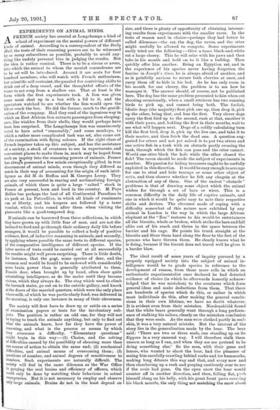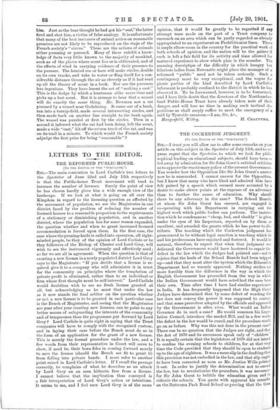EXPERIMENTS ON ANIMAL MINDS.
AFRENCH society has created at Longchamps akind of school of experiment on the mental powers of different kinds of animal. According to a correspondent of the Daily Mail, the testa of their reasoning powers are to be witnessed by as many subscribers as possible, probably to avoid any- thing like unduly personal bias in judging the results. But the idea is rather comical. There is to be a circus or arena, into which the animal to whom the mental conundrums are to be set will be introduced. Around it are seats for four hundred members, who will watch with French enthusiasm, but scientific sell-restraint, the puzzled fox contriving shifts to drink out of a deep vessel, and the thoughtful efforts of the crane to eat soup from a shallow one. That at least is the form which the first experiments took. A lion was given some meat shut up in a box with a lid to it, and the spectators watched to see whether the lion would open the lid or crack the box. He did the former, much to the gratifi- cation of the company. Had they read of the ingenious way in which an East African lion extracts passengers from sleeping- cars, like winkles from their shells, they would perhaps have been less surprised. The Long,champs lion was unanimously voted to have acted "reasonably," and some monkeys, to which a rather more complicated task was set, also came out of the examination with flying colours. If the right class of French inquirer takes up this subject, and has the assistance of a society, a stock of creatures to use in experiments, and convenient places to make them in, much may be hoped from such an inquiry into the reasoning powers of animals. France has alway's possessed a few minds exceptionally gifted in true discernment of animal minds, even though they differed as much in their way of amounting for the origin of such intel- ligence as did M. de Buffon and M. Georges Leroy. They are also very successful in rearing and acclimatising foreign animals, of which there is quite a large " salted " stock in France at present, born and bred in the country. M. Pays Mellier has perhaps the best of all Continental Paradises in his park at La Pataudiere, in which all kinds of ruminants run at liberty, and his keepers are followed by a tame wombat, which trots round after them when visiting the pheasants like a good-tempered dog.
If animals can be borrowed from these collections, in which they have grown up with little fear of man, and are not dis- inclined to feed and go through their ordinary daily life before strangers, it would be possible to collect a body of positive evidence, first, of inductive reasoning in animals, and secondly, by applying where possible the same tests to different species, of the comparative intelligence of different species. If the latter series of tests could be carried out at all successfully the results might well prove surprising. There is little doubt, for instance, that the gott, some species of deer, and the common seal would be found to be endowed with considerably more brain power than is generally attributed to them. Female deer, when brought up by hand, often show quite astonishing intelligence, as do the males until they become vicious, which they always do. The stag which used to climb the barrack stairs, go out on to the outside gallery, and knock at the doors of the married quarters, which were the only place where milk, of which he was particularly fond, was delivered in the morning, is only one instance in many of their cleverness.
The society will first have to draw up or settle on a series of examination papers or tests for the involuntary sub- jects. The position is rather an odd one, for they will not be trying to teach the animals anything, but only to find out What the animals know, how far they have the power of reasoning, and what is the process or means by which they overcome a difficulty. "Elementary questions" might begin in this way :--(1) Choice, and the solving of difficulties caused by the possibility of choosing more than one course of action to obtain the same end; (2) mechanical difficulties, and animal means of overcoming them; (3) questions of number, and animal degrees of sensitiveness to numbers. Such experiments are naturally difficult. The society will feel in the same dilemma as the War Office in gauging the real brains and efficiency of officers, which could only be done by watching their behaviour in actual emergencies. But it is not necessary to employ and observe only large animals. Brains do- not in the least depend on
size, and there is plenty of opportunity of obtaining interest- ing results from experiments with the smaller races. In the tests of reason used in choice—perhaps they had better be called dilemmas—the rat, the dog, the raven, and the otter might usefully be allowed to compete. Some experiments easily tried are the following :—Give a tame black-and-white rat a large cherry. This he will seize with his paws and then take in his mouth and hold on to it like a bulldog. Then quickly offer him another. Being an Egyptian rat, and in the experience of his species never having forgotten the famine in Joseph's time, he is always afraid of another, and so is painfully anxious to secure both cherries at once, and carry them off to hide in his bed. As he has only room in his mouth for one cherry, the problem is to see how he manages it. The answer should, of course, not be published here. The dog has the same problem presented to him when out shooting occasionally, when a small retriever has two running birds to pick up, and cannot bring both. The foolish, idiotic dogs (the majority) first pick one up, then drop it, pick up the other, bring that, and lose the first. Very clever dogs carry the first bird up to the second, rush at that, smother it with their paws, and, holding the first in their mouths, wait to see what will happen next. Dogs of a coldly calculating turn kill the first bird, drop it, pick up the live one, and take it to their master, and then fetch the dead one. A question sug- gested for otters and not yet solved is to put two otters and one active fish in a tank with an obstacle partly crossing the tank, through which the fish can pass and the otter cannot. Would one otter block the hole while the other chased the fish? The raven should be made the subject of experiments in number. His passion for hiding treasures ought to be usefully exploited in this direction. It would be easy enough to arrange for one to steal and hide teacups or some other object of vertu, and then observe whether he felt any chagrin at the abstraction of any of them. One of the easiest " obstacle " problems is that of drawing some object which the animal wishes for through a set of bars or wires. This is a common difficulty in the daily life of captive animals, and one in which it would be quite easy to note their respective shifts and devices. The cleverest mode of coping with a difficulty somewhat of this nature now exhibited by any animal in London is the way in which the large African elephant at the " Zoo " restores to his awould-be entertainers all the biscuits, whole or broken, which strike the bars and fall alike out of his reach and theirs in the space between the barrier and his cage. He points his trunk straight at the biscuits and blows them hard along the floor to the feet of the persons who have thrown them. He clearly knows what he is doing, because if the biscuit does not travel well he gives it a harder blow.
The ideal result of some years of inquiry pursued by a properly equipped society into the subject of animal in- telligence would be to grade species in reference to the development of reason, from those mere cells in which an enthusiastic experimentalist once declared he had detected evidence of choice (in which he afterwards honestly acknow- ledged that he was mistaken) to the creatures which form general ideas and make deductions from them. That there are hundreds of species which do this, or rather in which most individuals do this, after making the general conclu- sions in their own lifetime, we have no doubt whatever. It is evident even from their mistakes. Nordenskiiild found that the white bears generally went through a long perform- ance of stalking his sailors, clearly on the mistaken conclusion that they were seals. As the men were clothed partly in seal- skin, it was a very natural mistake. But the interest of the story lies in the generalisation made by the bear. The bear said: There are two or three seals, one standing up on its flippers in a very unusual way. I will therefore stalk them unseen as long as I can, and when they see me pretend to be doing something else.' So the men, with their guns and lances, who wanted to shoot the bear, had the pleasure of seeing him carefully crawling behind rocks and ice hummocks, making long detours this way and that, and every now and then clambering up a rock and peeping cautiously over to see if the seals had gone. On the open snow the bear would saunter off in another direction, and then, falling flat, push himself along on his belly, with his great front paws covering his black muzzle, the only thing not matching the snow about him. Just as the bear thought he had got his " seal," the latter fired and shot him, a victim of false analogy. It is unfortunate that many of the beat instances of animal action on reasonable premises are not likely to be reproduced on the stage of the French society's "circus." These are the actions of animals either pursuing or pursued. Many of these exhibit a know- ledge of facts very little known to the majority of mankind, such as of the places where scent lies or is obliterated, and of the effects of wind in carrying evidence of their presence to the pursuer. The hunted roe or hare will make circles, double on its own tracks, and take to water or fling itself for a con- siderable distance through the air as cleverly as if it had read up all the theory of scent in a book. Nor are the pursuers less ingenious. They have learnt the art of "making a cast." This is the dodge by which a huntsman alike saves time and picks up a lost scent. But it is strange to hear that a weasel will do exactly the same thing. Mr. Newman saw a rat pursued by a weasel near Godalming. It came out of a bank, ran into a turnip-field, made several intersecting circles, and then made back on another line straight to the bank again. The weasel was puzzled at first by the circles. Then in a second it inferred what the rat had been doing, left the scent, made a wide "cast," hit off the return track of the rat, and was on its trail in a minute. To which would the French society adjudge the first prize for being " reasonable " ?



































 Previous page
Previous page